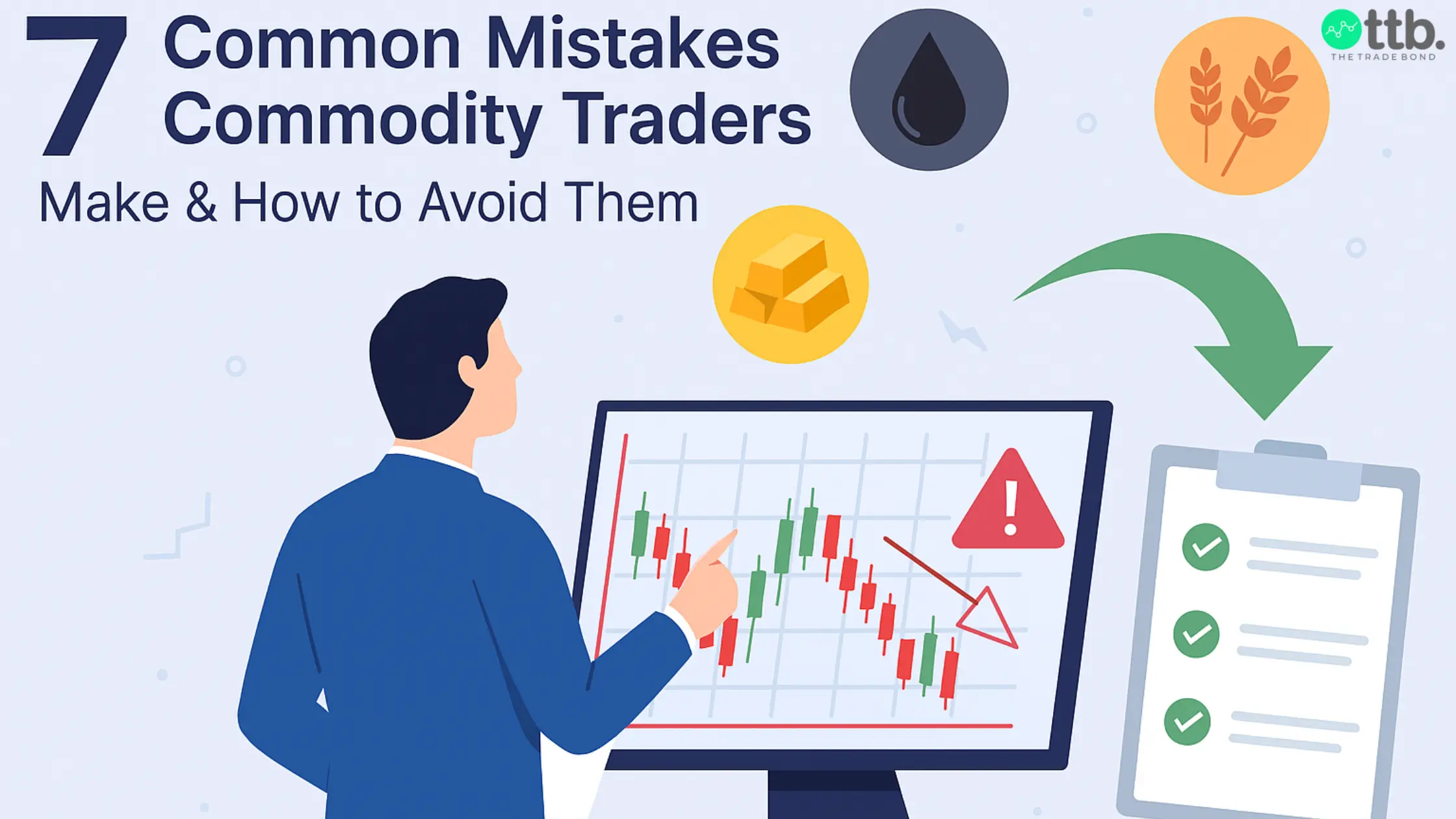The Common Mistakes Commodity Traders Make

Knowing about common mistakes commodity traders make
Commodity trading has become one of the strongest segments in the financial markets. These attract both beginners and seasoned investors. However, many traders often make so many mistakes that they impact their growth. In this blog, you will explore the 7 common mistakes commodity traders make. And also understand that these challenges can help your trading journey.
1. Trading Without a Clear Capital Allocation Plan
So, one of the most common mistakes commodity traders make is entering commodity markets without setting any capital allocation. Commodities such as gold, crude oil, and agricultural contracts are highly volatile. Trading these contracts without any specific risk capital can lead to overexposure. A well-planned allocation ensures that traders do not keep all their funds in one segment. For example, some amount of funds can be kept aside for long-term positions. While the remaining fund can be allocated for strategies like intraday trading tips or swing trading tips. With the help of a proper plan, you protect your capital when the market moves against you.
2. Lack of Knowledge About Commodity Markets
Commodity markets work differently when compared to indices or equities. So many traders start their journey without understanding how global demand-supply cycles affect them. And geopolitical developments affect commodity prices. For example, crude oil prices may react immediately to global developments. Also, commodities related to agriculture can be influenced by monsoon patterns. Without understanding this, many traders make impulsive decisions. Therefore, gaining knowledge through market research and getting guidance from a registered stock market advisor can help form informed strategies.
3. Overly depending on Unverified Tips
In today’s digital world, it is very common for traders to depend on free tips circulating on social media. Mainly social media platforms like Telegram. This is one of the common mistakes commodity traders make, as such information rarely considers technical or fundamental aspects. Therefore, depending on these inputs can lead to impulsive trades and major losses. Instead, you should focus on research-based insights from a registered advisor. Visit our commodity trading tips page to read more information about commodity trading. Also, contact our SEBI-registered investment advisor to align your decisions with your trading goals.
4. Not Understanding Margin Requirements
Margin plays a central role in commodity trading. So many traders underestimate the margin requirement for futures contracts. This can result in sudden position liquidations. For example, a small price movement in crude oil futures can wipe out the margin if you don’t plan it correctly. Hence, without any clarity, traders over-leverage their positions and face losses more than they expected. So, understanding how margin is calculated and aligning it with available capital ensures better risk management. Therefore, consulting with experts who provide Nifty option tips and commodity insights can also help traders to balance leverage.
5. Ignoring Technical Indicators While Making Decisions
Some traders depend only on instinct by ignoring the role of technical indicators. Technical indicators such as Moving Averages, RSI, or Bollinger Bands offer useful insights about entry and exit points. Neglecting these tools, traders often miss opportunities. Including technical analysis can help to validate decisions and manage timing better. Traders who combine these technical indicators with guidance from a registered share market advisor. This can help them to position their trades better to navigate through volatility.
6. Trading Without Any Proper Strategy
Jumping into commodity markets without a proper plan is one of the major common mistakes commodity traders make. A strategy is not just about entry and exit points. It also includes stop-loss levels, capital management, and time horizon. So, many beginners get influenced by market noise and enter trades without clarity. A proper strategy is based on different intraday patterns, swing trading tips, or fundamental analysis. Therefore, sticking to a structured approach ensures discipline and also helps traders to avoid emotional decisions.
7. Neglecting Fundamental and Global Factors
Commodity prices are directly linked to global factors like currency fluctuations, supply-chain changes, and economic data. Hence, neglecting these factors often results in unexpected market reactions. For example, a change in the U.S. dollar can immediately impact gold prices, while OPEC decisions affect crude oil. Tracking such developments allows traders to predict these movements, instead of reacting after the trend has already begun.
Conclusion
Commodity markets offer opportunities for traders who approach them with discipline and knowledge. The common mistakes commodity traders make such as trading without capital allocation, ignoring margins, and over-depending on unverified tips. These mistakes are not only made by beginners but also affect experienced traders if they are overlooked. At The Trade Bond, we educate traders about these commodity markets. As a SEBI-registered investment advisor, we help traders to refine their decisions. Combining these technical insights with global fundamentals helps to build confidence and avoid these mistakes. Although you can explore opportunities in the commodity space.
FAQ's
Why is capital allocation important in commodity trading?
Capital allocation help traders to manage risk by ensuring funds are distributed across positions instead of single trade.
What is the best way to build a proper strategy in commodity trading?
A strong strategy includes technical analysis, fundamental research, and stop-loss levels.
What psychological mistakes do commodity traders make?
Common mistakes like chasing losses, being overconfident after a small win, and reacting emotionally without a proper strategy.
